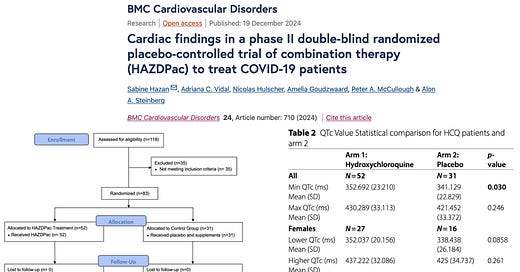BREAKING STUDY: Hydroxychloroquine Proven Safe with No Evidence of Cardiac Complications
Cardiac findings in a phase II double-blind randomized placebo-controlled trial of combination therapy (Hydroxychloroquine, Azithromycin, Vitamin C, Vitamin D, Zinc) to treat COVID-19 patients
by Nicolas Hulscher, MPH
The ProgenaBiome and McCullough Foundation study titled Cardiac findings in a phase II double-blind randomized placebo-controlled trial of combination therapy (HAZDPac) to treat COVID-19 patients, co-authored by Sabine Hazan, Adriana C. Vidal, Nicolas Hulscher, Amelia Goudzwaard, Peter A. McCullough & Alon A. Steinberg, was just published in the journal BMC Cardiovascular Disorders:
Objective
Hydroxychloroquine paired with Azithromycin, Vitamin C, Vitamin D, and Zinc (HAZDPac), was used as a multidrug therapy method to treat COVID-19 illness and superimposed secondary bacterial pneumonia. Concerns have been raised though about such combinations regarding cardiac QTc interval prolongation and risks of arrhythmias, which we set out to address in this study.
Design
We evaluated cardiac safety in a Phase II Double-Blind Randomized Placebo-Controlled Trial of Combination Therapy to Treat COVID-19 Infections study, conducted by ProgenaBiome. Acutely ill patients with COVID-19 had QTc intervals recorded in an outpatient setting utilizing a continuously worn EKG monitor for the duration of the 10 days treatment. QTc intervals were normally distributed. Two-sample t-tests were used to measure any significant differences in QTc intervals between treatment and placebo groups.
Results
Between March 2020 and June 2021, 118 COVID-19 patients were recruited and signed informed consent, of which 83 were enrolled for a Double-Blind Randomized Placebo-Controlled Trial. Of the 83, 52 patients were randomly assigned to receive HAZDPac treatment, and 31 patients to receive placebo. Overall, and in stratified analysis by gender, maximum QTc values of patients in the treatment arm were normal and no differences were observed when compared to maximum QTc values from patients in the placebo arm (p ≥ 0.15). There were no adverse events related to HAZDPac treatment.
Conclusion
We found that the outpatient treatment of COVID-19 patients with HAZDPac which includes Hydroxychloroquine and Azithromycin, was not associated with prolongation of QTc compared to placebo and QTc remained within normal range.
None of the COVID-19 patients treated with HAZDPac experienced severe adverse events or mortality, underscoring the safety and potential efficacy of this therapy. Our findings provide strong evidence to counter the notion that hydroxychloroquine is unsafe due to QTc interval prolongation, as no significant changes to abnormal QTc ranges were observed compared to placebo in this rigorously monitored outpatient trial:
Hydroxychloroquine has been a controversial drug due to the speculation that either alone or paired with azithromycin taken orally leads to a prolonged QTc interval and Torsade de Pointes, particularly in an inpatient hospital setting [10,11,12,13]. Yet, in this outpatient setting study conducted by ProgenaBiome, a private research clinic located in Ventura, California, such cardiac findings of patients treated with Hydroxychloroquine, paired with Azithromycin, Vitamin C, Vitamin D, and Zinc (HAZDPac) did not reflect previous concerns. The mean maximum QTc value found in the data we gathered from treated patients’ continuously worn EKG monitor was 437 ms (SD = 32), which falls into the normal range for both males and females, QTc normal range for males is 350–450 ms, and for females is 360–460 ms [14].
Our study was published just as the Academic Publishing Cartel unethically retracted the study, Hydroxychloroquine and azithromycin as a treatment of COVID-19: results of an open-label non-randomized clinical trial. This landmark study, which demonstrated hydroxychloroquine's benefit against COVID-19, was published for four years and cited by 6,713 scientists, physicians, and researchers before being unjustly removed. One way the Biopharmaceutical Complex promotes their genetic injections is by censoring and attacking cheaper, safer, and more effective treatments like hydroxychloroquine.
Despite the strong headwinds of censorship, we will continue to conduct, support, and disseminate truthful, high-quality research to serve public health and uphold scientific integrity.
Nicolas Hulscher, MPH
Epidemiologist and Foundation Administrator, McCullough Foundation
www.mcculloughfnd.org
Please consider following both the McCullough Foundation and my personal account on X (formerly Twitter) for further content.






My functional regenerative alternative medicine doctor used it on my husband and myself in 2021 after a bout with Covid. In conjunction a ivermectin and spike support and high dose Vit C we were healed in 3 days.
I took various chloroquine products as a malaria prophylaxis for years. How about gathering testimonials from the 100's of millions that have taken the stuff and dispense with the useless studies. BTW have a look at the dashboards for any number of African countries during then 2020 'pandemic'. Notice anything strange? Yup... almost no infections nor deaths all year long until... the vaccine came out. Then a hockey stick appears on the graph showing an astounding spike in deaths. Things that make ya go 'hmmm'.